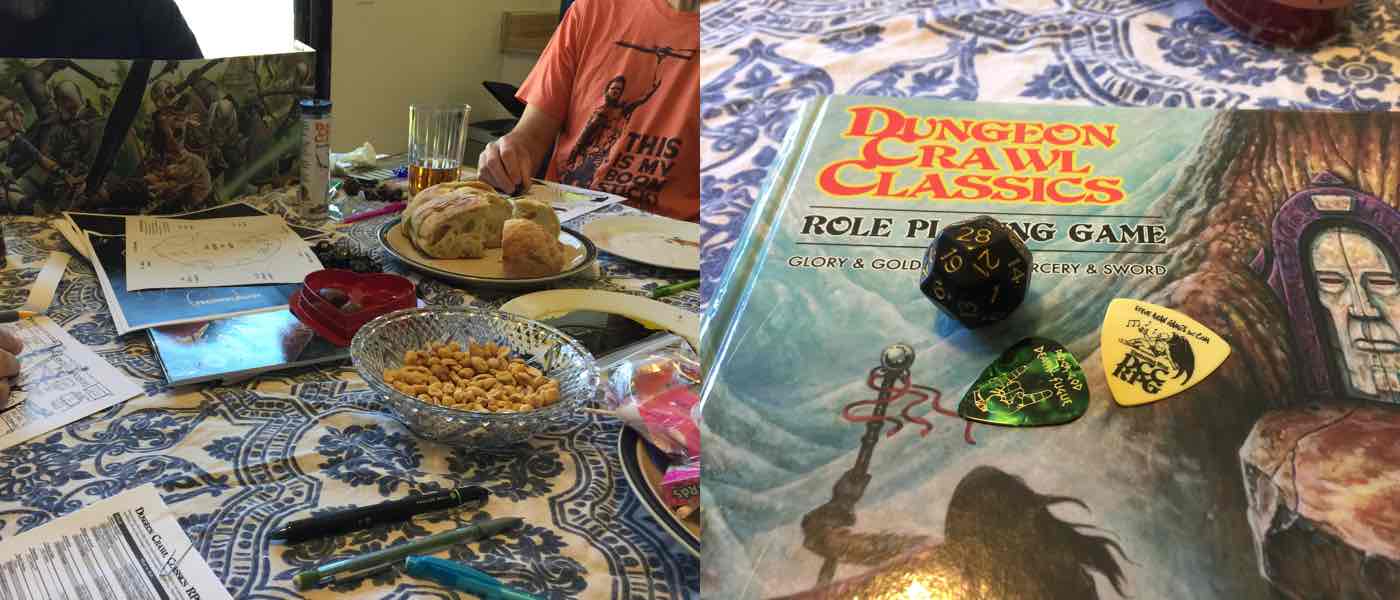Dungeon Crawl Classics – Gaming Like It’s 1982

Man Out of Time
Yesterday I had the privilege of playtesting a Dungeon Crawl Classics level 0 adventure under development by my friend Steve Bean, the man behind Steve Bean Games. It was my first time playing DCC. We all had fun with the adventure, and as with so many of Steve’s creations, it’s gonzo and thought-provoking at the same time. I won’t reveal anything about it except to say it’s tailored to the Umerica setting first seen in Reid San Filippo’s Crawling Under A Broken Moon blog & ’zine.
Though I’d played with three of the four folks at the table before, this wasn’t my normal weekly group. As fate would have it, the house we played in was a stone’s throw from the house where I played The Arduin Grimoire way back in 1982 as a high school freshman. I found myself thinking back to Saturday afternoons of long ago and how playing Dungeon Crawl Classics echoes the feel of those sessions.
Death is a Star
For one thing, if you play DCC, your characters are going to die. Steve tells me it’s not just a part of DCC, but it’s a celebrated aspect of the game. In 1982 everything we played was pretty deadly. The lethality varied by game system and setting, but The Arduin Grimoire as our DM ran it was pretty gnarly. Also, the concept of balancing encounters with any degree of precision was unknown. If you came across an obviously superior foe, you did the smart thing and ran like hell. Of course we didn’t always do the smart thing, and our characters didn’t often last beyond the first couple of adventures.
No One Like You
The Arduin Grimoire and every other RPG we played back then placed primary responsibility for the success or failure of every game session firmly on the DM. This was the flip side of the lethality coin; you could kill player characters with ease, but if you didn’t provide a memorable and enticing adventure, it was on you as the DM for not having your act together.
One play test isn’t enough to absorb the full flavor of a game, but DCC places a similar amount of control in the DM’s hands by advocating for DM discretion rather than highly-detailed rules covering every eventuality. With that latitude comes a responsibility to adjudicate consistently.
No Easy Street
In the early 80s we were strong proponents of what might be called a “Work for Your XP” school of thought. We rolled characters up one attribute at a time, using three dice. If your Fighter had a STR of 14, you made the best of it. We didn’t want to have anything to do with DMs who ran “Monty Haul” campaigns where characters could rocket through levels with ease. I still remember the elation when my AD&D Thief reached third level. DCC, with its emphasis on player skill, struck me as being firmly in the “Work for Your XP” camp, which Steve confirmed. Because of the high death count in DCC games, a 5th level character is a rarity. He also noted that DCC adventures are structured so low-level characters can have meaningful adventures rather than murder hobo XP grinds, which is a definite advantage over the old days.
One Step Beyond
The visual aesthetic of DCC fascinates me because while it evokes the flavor of early D&D and its offshoots, it’s also quite distinctive. I confess that the aesthetic isn’t particularly compelling for me, but I appreciate how it walks a tightrope between harkening back to the early days of the hobby and retaining a feel of its own.
What I Must Do
One of my favorite things about DCC is the level 0 funnel. Each player runs several level 0 characters, most of whom wind up dying. It sounds brutal, and it is. But for certain kinds of games it can be quite effective. I tend to run lots of post-apocalypse games, and I am already frothing at the mouth to adapt this mechanism to other systems.
I could start a campaign in which the players each run several survivors through a gauntlet scenario. It would end with each player in possession not only of a character or two that have managed to overcome harrowing odds, but also of the memories of those characters that perished along the way. It codifies and reinforces the lethality of a campaign. Once players run through that funnel and lose some characters, they’ll have an ingrained understanding of the game world’s lethality.
Dynamite
It’s easy to see the appeal of DCC. It does an excellent job of eliciting the old school feel, while introducing all sorts of clever and effective improvements, from unpredictable magic to an intuitive difficulty progression.
For links to more reviews and other info, check out the UJ Dungeon Crawl Classics page.
Ω